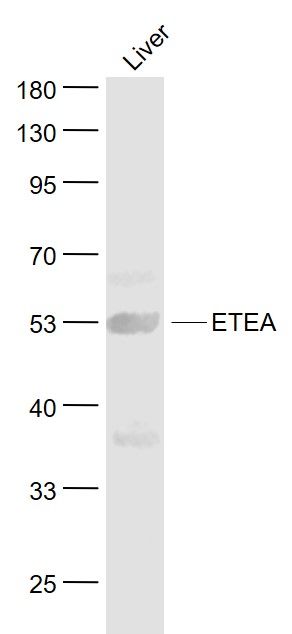ETEA Polyclonal Antibody
Purified Rabbit Polyclonal Antibody (Pab)
- SPECIFICATION
- CITATIONS
- PROTOCOLS
- BACKGROUND

Application
| WB, IHC-P, IHC-F, IF, ICC, E |
|---|---|
| Primary Accession | Q96CS3 |
| Reactivity | Rat |
| Host | Rabbit |
| Clonality | Polyclonal |
| Calculated MW | 53 KDa |
| Physical State | Liquid |
| Immunogen | KLH conjugated synthetic peptide derived from human ETEA |
| Epitope Specificity | 81-180/445 |
| Isotype | IgG |
| Purity | affinity purified by Protein A |
| Buffer | 0.01M TBS (pH7.4) with 1% BSA, 0.02% Proclin300 and 50% Glycerol. |
| SUBCELLULAR LOCATION | Cytoplasm. Lipid droplet. Endoplasmic reticulum. |
| SIMILARITY | Contains 1 UBX domain. |
| SUBUNIT | Identified in a complex that contains SEL1L, OS9, FAF2/UBXD8, UBE2J1/UBC6E and AUP1. Interacts with YOD1. |
| Important Note | This product as supplied is intended for research use only, not for use in human, therapeutic or diagnostic applications. |
| Background Descriptions | ETEA is a 445-amino acid protein associated with atopic dermatitis (AD), a chronic noncontagious relapsing inflammatory skin disease characterized by eczematous skin lesions and also referred to as eczematous dermatitis. Other atopic diseases such as hay fever, asthma and conjunctivitis often occur along with AD. ETEA shows higher expression in T cells and eosinophils of patients with AD than in T cells and eosinophils of unaffected individuals. T cells are influential in the regulation of the inflammatory process of this disease. The persistence of jAD is attributed to dysregulated apoptosis in T cells, eosinophils, and keratinocytes. ETEA may be involved in the resistance to apoptosis in T cells and eosinophils of AD patients. |
| Gene ID | 23197 |
|---|---|
| Other Names | FAS-associated factor 2, Protein ETEA, UBX domain-containing protein 3B, UBX domain-containing protein 8, FAF2, ETEA, KIAA0887, UBXD8, UBXN3B |
| Target/Specificity | Broadly expressed, with highest levels in brain. |
| Dilution | WB=1:500-2000,IHC-P=1:100-500,IHC-F=1:100-500,ICC=1:100-500,IF=1:100-500,ELISA=1:5000-10000 |
| Storage | Store at -20 ℃ for one year. Avoid repeated freeze/thaw cycles. When reconstituted in sterile pH 7.4 0.01M PBS or diluent of antibody the antibody is stable for at least two weeks at 2-4 ℃. |
| Name | FAF2 {ECO:0000303|PubMed:34739333, ECO:0000312|HGNC:HGNC:24666} |
|---|---|
| Function | Plays an important role in endoplasmic reticulum-associated degradation (ERAD) that mediates ubiquitin-dependent degradation of misfolded endoplasmic reticulum proteins (PubMed:18711132, PubMed:24215460). By controlling the steady-state expression of the IGF1R receptor, indirectly regulates the insulin-like growth factor receptor signaling pathway (PubMed:26692333). Involved in inhibition of lipid droplet degradation by binding to phospholipase PNPL2 and inhibiting its activity by promoting dissociation of PNPL2 from its endogenous activator, ABHD5 which inhibits the rate of triacylglycerol hydrolysis (PubMed:23297223). Involved in stress granule disassembly: associates with ubiquitinated G3BP1 in response to heat shock, thereby promoting interaction between ubiquitinated G3BP1 and VCP, followed by G3BP1 extraction from stress granules and stress granule disassembly (PubMed:34739333). |
| Cellular Location | Cytoplasm. Lipid droplet Endoplasmic reticulum |
| Tissue Location | Broadly expressed, with highest levels in brain. |

Thousands of laboratories across the world have published research that depended on the performance of antibodies from Abcepta to advance their research. Check out links to articles that cite our products in major peer-reviewed journals, organized by research category.
info@abcepta.com, and receive a free "I Love Antibodies" mug.
Provided below are standard protocols that you may find useful for product applications.
If you have used an Abcepta product and would like to share how it has performed, please click on the "Submit Review" button and provide the requested information. Our staff will examine and post your review and contact you if needed.
If you have any additional inquiries please email technical services at tech@abcepta.com.













 Foundational characteristics of cancer include proliferation, angiogenesis, migration, evasion of apoptosis, and cellular immortality. Find key markers for these cellular processes and antibodies to detect them.
Foundational characteristics of cancer include proliferation, angiogenesis, migration, evasion of apoptosis, and cellular immortality. Find key markers for these cellular processes and antibodies to detect them. The SUMOplot™ Analysis Program predicts and scores sumoylation sites in your protein. SUMOylation is a post-translational modification involved in various cellular processes, such as nuclear-cytosolic transport, transcriptional regulation, apoptosis, protein stability, response to stress, and progression through the cell cycle.
The SUMOplot™ Analysis Program predicts and scores sumoylation sites in your protein. SUMOylation is a post-translational modification involved in various cellular processes, such as nuclear-cytosolic transport, transcriptional regulation, apoptosis, protein stability, response to stress, and progression through the cell cycle. The Autophagy Receptor Motif Plotter predicts and scores autophagy receptor binding sites in your protein. Identifying proteins connected to this pathway is critical to understanding the role of autophagy in physiological as well as pathological processes such as development, differentiation, neurodegenerative diseases, stress, infection, and cancer.
The Autophagy Receptor Motif Plotter predicts and scores autophagy receptor binding sites in your protein. Identifying proteins connected to this pathway is critical to understanding the role of autophagy in physiological as well as pathological processes such as development, differentiation, neurodegenerative diseases, stress, infection, and cancer.


